But most Americans think Judicial Branch are the final arbiters of what is or is not constitutional
The American public, Democrat and Republican, agree that power rests with the Judiciary when it comes to having the final say in determining what is constitutional. It is a power that a plurality thinks the courts should have. And in the latest Economist/YouGov Poll, both parties have favorable opinions of the Supreme Court.
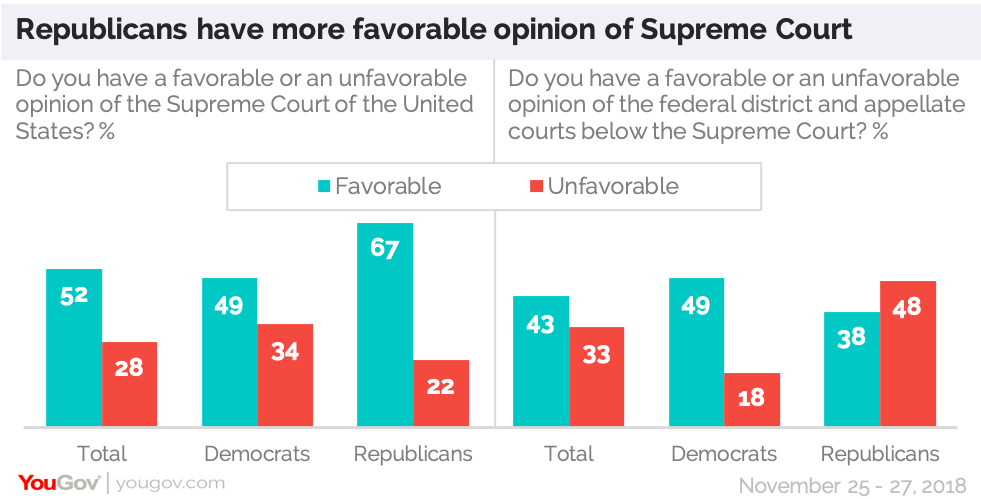
But the courts can’t escape partisan wrangling. Democrats are favorable towards the Supreme Court, but they are less favorable than Republicans are. The situation is reversed when the public is asked about federal district and appellate courts: Democrats are positive towards those courts; Republicans are not.
Of course, it is the judiciary in the lower federal courts (below the Supreme Court) which President Trump attacked last week (specifically calling out “Obama judges”). Although Supreme Court Chief Justice John Roberts chided the President, noting that judges aren’t identified as belonging to the President who nominated them, but are “dedicated judges doing their level best.”
That is a sentiment much of the public likes, though nearly half of Republicans disagree with it. The President’s retort that there are “Obama judges,” and that they have a “much different point of view than the people charged with the safety of our country” is a sentiment Americans are more likely to disagree than agree with. But on this question the partisan split is much more extreme. Three in four Democrats disagree while nearly as many Republicans agree.
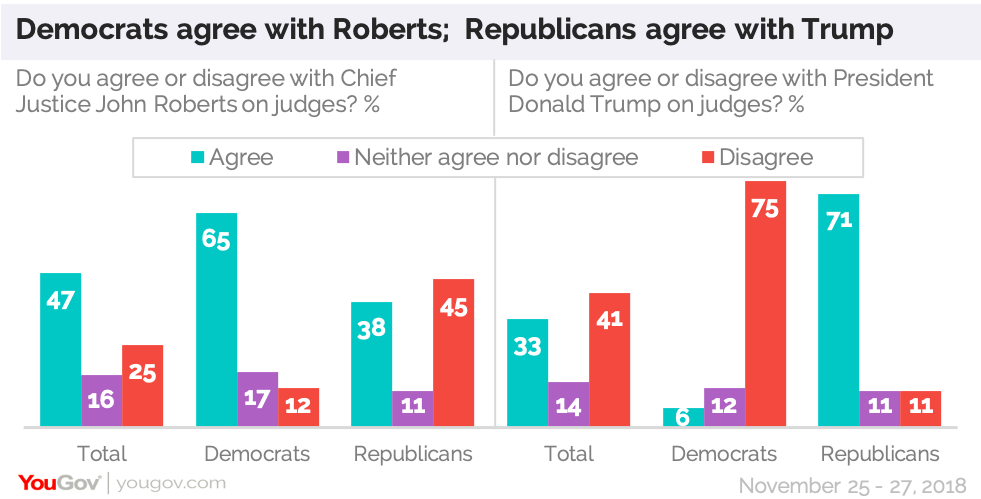
Republicans have softened towards Chief Justice Roberts: after he cast the deciding vote declaring the constitutionality of the Affordable Care Act (Obamacare), Republicans became decidedly negative about him. Now, as he leads a Court that is likely to become even more conservative, Roberts gets positive evaluations from both Republicans and Democrats. However, even though the ACA decision was made more than six years ago, Republicans are still less positive than Democrats are towards the Justice.
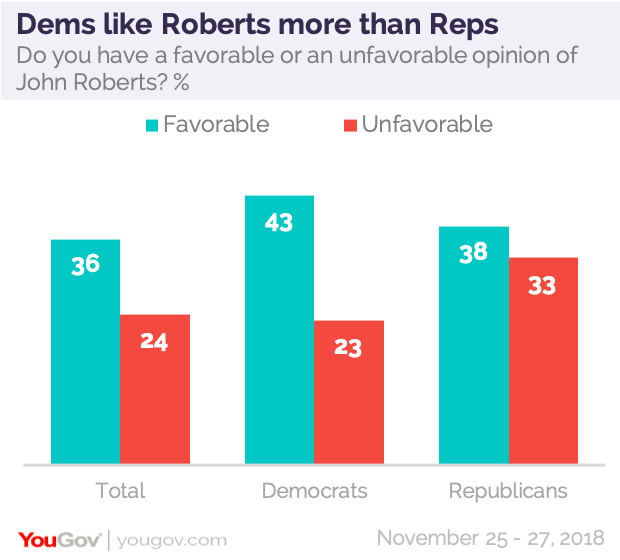
Roberts, a George W. Bush nominee, is unusual in that those in the party of the President who named him are less favorable about him than those in the opposing party. All the other Justices are seen more favorably by those who identify with the party of the President who nominated them than by those who do not. Only Stephen Breyer, the least well-known of the Democratic-nominated Justices (nominated by President Bill Clinton) ekes out a positive rating from Republicans. 27% of Republicans are favorable towards Breyer, 24% are not.
But for most of the Justices, the partisan splits are great, with majorities of Republicans holding unfavorable opinions of other Democratic appointees like Ruth Bader Ginsburg and Sonia Sotomayor (44% of Republicans are negative towards Elena Kagan). Meanwhile, a majority of Democrats hold unfavorable views of GOP-nominated Justices Clarence Thomas and Brett Kavanaugh.
In fact, opinions of Kavanaugh, the newest Supreme Court Justice, remain the most partisan. Ruth Bader Ginsburg appears to be the most polarizing Democratic appointee.
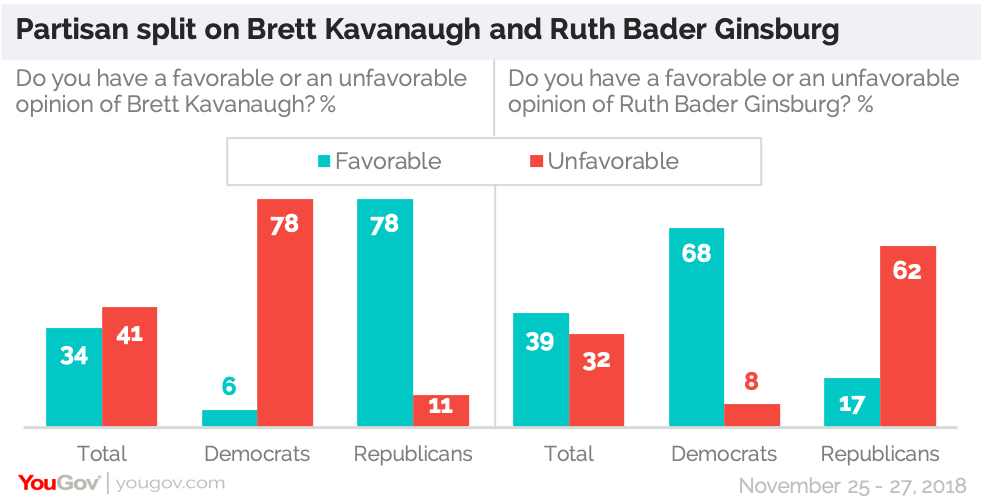
Kavanaugh is the only Justice who receives more negative than positive assessments, and there is little gender difference within parties on these two Justices.
The current White House occupant is a Republican, so it no surprise that Republicans would prefer that his policies not be stopped while they’re being challenged in Court (those challenges by citizens get the support in principle of 71% of the public). If the incumbent President were a Democrat, the responses might be reversed.
Republicans also are less likely than Democrats to support the power of the Courts to declare laws or policies unconstitutional. 40% of Republicans approve of that power, but 31% do not. Americans overall give support it by more than two to one.
But what may be most critical in Court evaluation is that Republicans, far more than Democrats, view recent Courts as “biased” – biased for Barack Obama and biased against Donald Trump. Democrats say the courts have been fair, not biased in any way. Still, both parties continue to look to the Courts, and not to Executive or Legislative branches, when to comes to who should have the final say on the constitutionality of laws and policies.
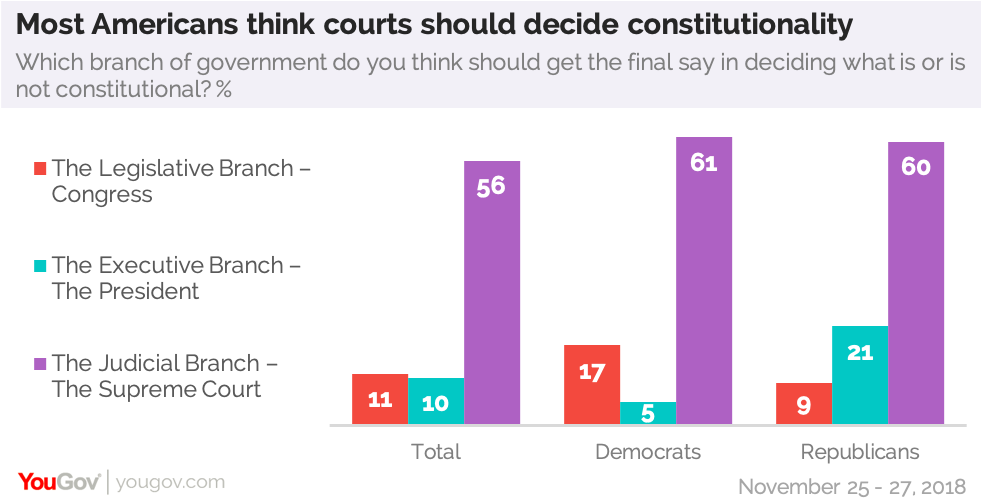
See full toplines and tables results
Image: Getty







